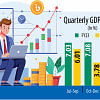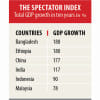Bangladesh’s GDP to grow 5.7% in FY25

Bangladesh's gross domestic product (GDP) growth will decrease to 5.7 percent in 2024-25 from 5.8 percent in the current fiscal year while inflation will ease to 8 percent, according to the Mastercard Economic Institute (MEI).
It also projected that the central bank's policy rate would be 9 percent in the fiscal year beginning on July 1.
The MEI said persistently elevated inflation is weighing on consumer purchasing power and higher US interest rates for a longer period could add to external sector vulnerabilities.
The observations were cited in a keynote speech delivered by David Mann, chief economist for Asia Pacific and Middle East Africa at Mastercard, at a roundtable at the Sheraton Dhaka hotel yesterday. He also presented the latest outlook on global and Bangladesh markets.
The government has targeted a GDP growth rate of 6.75 percent for FY25, which is considered ambitious given the current economic crisis.
For the current fiscal year, the initial growth estimate was 7.5 percent. However, provisional figures from the Bangladesh Bureau of Statistics showed that the growth rate for 2023-24 was 5.82 percent.
The World Bank has projected that the economy will expand by 5.7 percent in FY25, driven by a modest recovery in private consumption supported by moderation in inflation.
The MEI said Bangladeshi consumers have doubled their share of spending on essentials compared to the pre-pandemic levels, driven by the rising prices of basic items at the cost of discretionary expenses.
Mann said the US may cut its policy rate multiple times this year. "If this happens, it will be beneficial for Bangladesh."
While remittance income in Bangladesh has increased in recent months, import expenditures are also on the rise, he added.
Mastercard channels 20 percent of Bangladesh's total remittance, according to Syed Mohammad Kamal, the country manager of Mastercard.
He said the introduction of a crawling peg exchange rate regime in May and a better alignment between official and unofficial exchange rates are driving remittances up.
"The market-based exchange rate will accelerate remittance growth."
Atiur Rahman, a former governor of the central bank, said Bangladesh should facilitate doing business further to attract more foreign direct investment because FDI is a key driver of the economy.
According to Mastercard, global economic growth is set to remain steady between 2023 and 2024, driven by the two largest economies in Asia -- India and China.
Higher US interest rates and geopolitical tensions are adding upward pressures on crude oil prices, and they are posing key risks for emerging markets.
It forecasted that inflation would soften over the year for most markets.

 For all latest news, follow The Daily Star's Google News channel.
For all latest news, follow The Daily Star's Google News channel. 








Comments